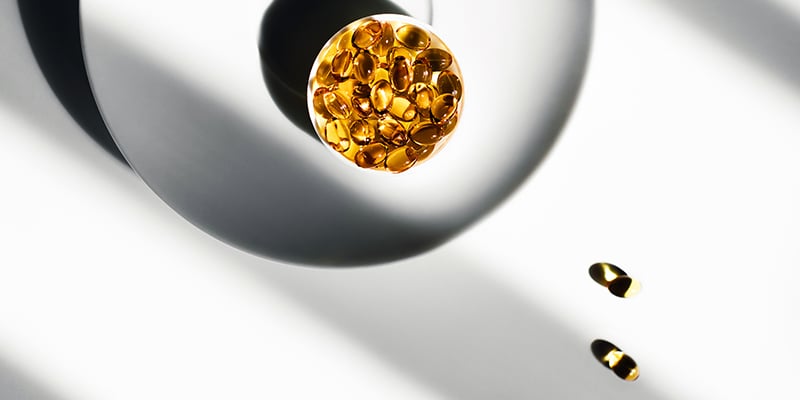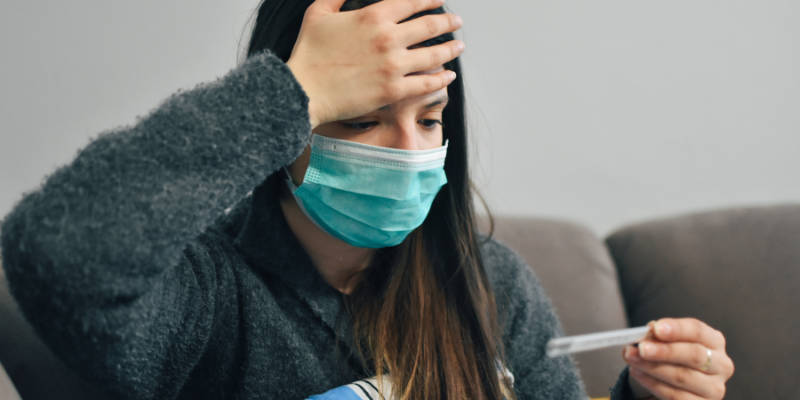
Stay inside! Avoid the beach! Stay away from parks! Messages like these have been hammered into our heads during the coronavirus pandemic. But being cooped up inside while we quarantine is taking a toll—not just on our mental well-being, but also by preventing us from getting much-needed vitamin D from the sun.
The ABCs of Vitamin D
Vitamin D is a fat-soluble vitamin that is derived from foods, supplementation, or sun exposure. This last one is why people often call it the “sunshine vitamin,” but vitamin D could actually be called the “immunity vitamin.” A 2011 review on vitamin D and the immune system in the Journal of Investigative Medicine detailed a wealth of scientific findings showing its protective effects on immunity. Vitamin D also plays an essential role in overall brain health, mood, memory, weight, and other important bodily processes.
With the threat of COVID-19 and the emotional challenges that come with quarantine, vitamin D is more important than ever. The bad news is, most Americans aren’t getting enough of it. According to a report in the Archives of Internal Medicine, more than 75% of American adults have low levels of vitamin D.
How can you tell if you’re one of them? Get your level checked at your next doctor’s appointment and optimize it if necessary. It’s a simple blood test called 25-hydroxyvitamin D level. Here’s what the results mean:
Deficient: <30 ng/mL (nanograms per milliliter)
Normal: 30-100 ng/mL
“Low-Normal”: 30-50 ng/mL
Optimal: 50-100 ng/mL
Take note that many traditional doctors will simply tell you whether or not you fall into the normal level. But you should ask for your exact number. Having a low-normal level isn’t good enough. It’s recommended that you aim for the optimal level.
7 Reasons to Supplement Your Diet With Vitamin D
1. Boost immunity.
With the pandemic, a healthy immune system is essential. Emerging research is showing that low vitamin D levels may increase the risk of dying from COVID-19. In a pre-print cohort study (pre-print means it is not yet peer-reviewed) from Indonesia, researchers looked at the influence of age, sex, pre-existing conditions, and vitamin D levels on outcomes in 780 patients with COVID-19. The majority of deaths were among older males with pre-existing conditions and who had below-normal vitamin D levels. The researchers concluded that when controlled for age, sex, and comorbidity, vitamin D level is strongly associated with the risk of mortality from COVID-19.
An article published in a 2020 issue of the journal Nutrients presents evidence that vitamin D supplementation could reduce the risk of infections and deaths from COVID-19. This paper details several mechanisms through which vitamin D can reduce the risk of infections.
2. Reduce the risk of respiratory illness.
Considering that COVID-19 affects the respiratory tract, finding ways to protect against respiratory infections is key. In 2017, BMJ published a review of 25 controlled trials involving 11,231 participants ages 0 to 95 and found that vitamin D supplementation reduced the risk of acute respiratory tract infections among all participants.
3. Achieve or maintain a healthy weight.
Did you know that higher body-fat percentages are linked to lower levels of vitamin D? That’s what a study in the Journal of Clinical Endocrinology and Metabolism found when they analyzed vitamin D levels in 410 women. The researchers suggest that people who are obese may need higher supplementation with vitamin D to achieve healthy levels. Results of a 2012 study in Nutrition Journal found that taking vitamin D can aid in reducing body fat in overweight and obese individuals.
This is especially important in the current pandemic because obesity is one of the biggest risk factors for serious illness and hospitalization from COVID-19, according to a pre-print study of over 4,100 people in New York.
4. Brighten moods.
The lower your vitamin D levels, the more likely you are to suffer from the blues. Decades of research point to an association between low levels of vitamin D and mood problems, such as depression. Supplementation may help, according to a 2008 study in the Journal of Internal Medicine that followed 441 overweight and obese adults with depression for one year. In this study, individuals who took vitamin D (20,000 IU or 40,000 IU per week) reported a significant decrease in their depressive symptoms, but those who took a placebo did not see such improvement.
5. Protect cognitive function.
Receptors for vitamin D are found throughout the brain and play a critical role in learning and making memories. Research in a 2015 issue of JAMA Neurology found that older adults with low levels of vitamin D experienced cognitive decline at a faster rate than people with healthy vitamin D levels. Promising research on humans in the Journal of Alzheimer’s Disease has shown that vitamin D may stimulate the immune system to rid the brain of beta-amyloid, the plaques seen in Alzheimer’s disease.
6. Promote physical health.
Vitamin D deficiencies have been linked to approximately 200 conditions. Serious illnesses, such as cancer, heart disease, and diabetes, are associated with low levels of the nutrient. These 3 diseases are also among the top 10 co-morbidities seen in people who died from COVID-19, according to statistics compiled by the state of New York.
7. Support your mental health.
The link between vitamin D and mental health is strong, as over half of all psychiatric inpatients are deficient in vitamin D, according to research in Currents in Psychiatry. Below-normal levels of vitamin D have been associated with depression (as you saw above), as well as autism and psychosis.
Depression, anxiety, panic attacks, and other mental health issues can’t wait. During these uncertain times, your mental well-being is more important than ever and waiting to get treatment until the pandemic is over is likely to make your symptoms worsen over time.
At Amen Clinics, we’re here for you. We offer mental telehealth, remote clinical evaluations, and video therapy for adults, children, and couples, as well as in-clinic brain scanning to help our patients. Find out more by speaking to a specialist today at 888-288-9834. If all our specialists are busy helping others, you can also schedule a time to talk.





What is the correct amount of vitamin D to take daily?
Comment by Linda A. Gormley-Guner — October 26, 2020 @ 4:38 AM
Thank you for this information. I had stopped taking my Vitamin n D regularly because I was not aware of its benefits. Getting back on .
Comment by Mary Porter — October 26, 2020 @ 5:54 AM
I have been told Ive had a concussion for nearly 2 years after an auto accident. Do you accept Sparrow Medicare Advantage Plus or Straight Medicaid?
Comment by Sharon Peek — October 26, 2020 @ 6:07 AM
I take 5000 vitm D.It has helped me for sure.
Comment by Evelyn Ausdemore — October 26, 2020 @ 6:30 AM
Thank you for the valuable information
Comment by Bernardo Bautista — October 26, 2020 @ 6:43 AM
You didn’t mention the suggested amount for daily protection. Doesn’t matter if you don’t know. Would be great to get the answer.
Thx
Cynthia
Comment by Cynthia Schoch — October 26, 2020 @ 7:15 AM
Which vitamin D3 is the best on the market?
Comment by Cindy — October 26, 2020 @ 7:33 AM
I’ve been on daily 5000 IU of Vitamin D3 for 15 years. Prior to 2005, I only took D3 from October through March since my blood levels mid-summer were 60 without D3. As I aged, my blood levels fell to 26-32 during the summer even with daily limited UVB exposure and magnesium supplementation. Since the start of COVID I have increased my daily D3 to 10,000 IU daily to provide additional protection due to my autoimmune limitations (as recommended by my MD).
Comment by EiLL — October 26, 2020 @ 7:48 AM
Good information but what is missing is how does one correct a Vitamin D deficiency? It would be helpful to have more information on how to address the issue rather than only hearing about the problem.
Comment by Andy Burdge — October 26, 2020 @ 10:28 AM
I would like to know your opinion on taking statins and the risk to the brain My husbands doctor wants him on statins even though his Cholesterol levels are normal He had a mini stoke 8 years ago. Ian very hesitant to have him take this drug due to all the side affects and possible link to Alzheimer’s
Comment by Marcia Vanderwall — October 26, 2020 @ 11:18 AM
What is the downside of over 100? How critical is it to maintain <100?
Comment by Linda — October 26, 2020 @ 11:20 AM
Vit D3 is often derived from lanolin(sheep) or fish oil. It is also available as a fermented source from plants (Vegan)
Comment by Jeff Thurston — October 26, 2020 @ 12:06 PM
D2 vs D3 ~ What is the difference? Benefits of each? Which is better for you? Should you also take K, if so, how much?
Comment by Betty — October 26, 2020 @ 5:08 PM
Vitamin D with K2 (Mk7)
Comment by Steven — October 26, 2020 @ 6:29 PM